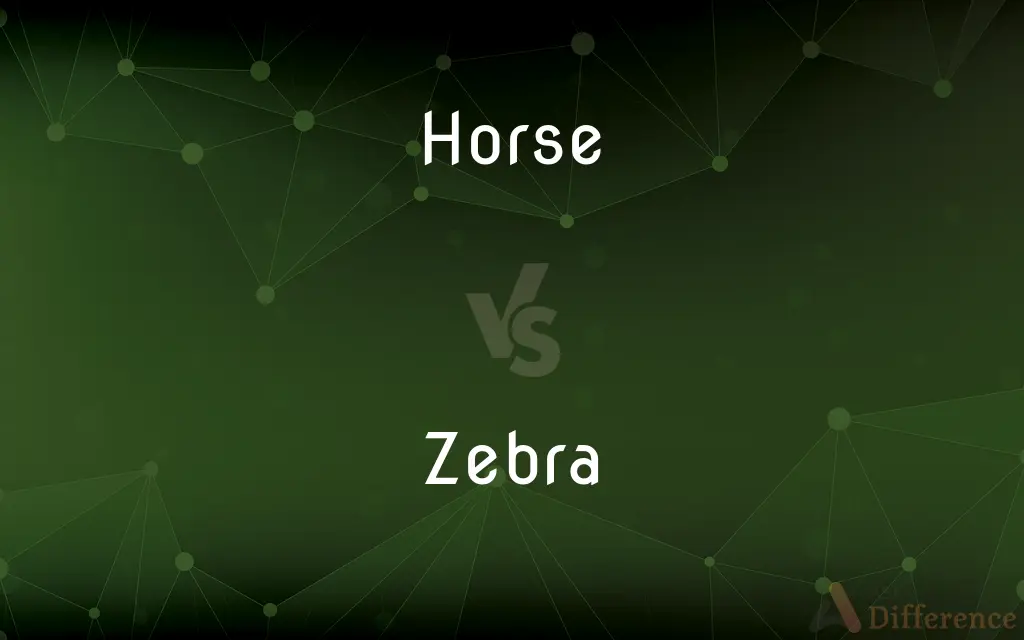Horse vs. Zebra — What's the Difference?
By Tayyaba Rehman & Urooj Arif — Published on October 13, 2024
Horses are domesticated animals known for their strength and versatility in work and sport, with solid coat colors. Zebras are wild animals with distinctive black-and-white stripes, adapted for camouflage.

Difference Between Horse and Zebra
Table of Contents
ADVERTISEMENT
Key Differences
Horses are domesticated mammals widely used for riding, racing, and agricultural work, known for their variety in breeds, sizes, and coat colors. They have been integral to human societies for thousands of years, contributing to transportation, farming, and warfare. Zebras, on the other hand, are wild African equines characterized by their unique black-and-white striped patterns, which serve as camouflage to deter predators and insects. Unlike horses, zebras have never been domesticated on a large scale due to their more unpredictable nature and stronger survival instincts.
Horses are celebrated for their speed, endurance, and ability to form bonds with humans, allowing for extensive training and versatility in their roles, while zebras are known for their strong social structures within herds and their ability to survive in challenging environments. This difference highlights the contrast between the domestic utility of horses and the wild resilience of zebras.
In terms of physical characteristics, horses typically have a smoother coat with a range of solid colors, including bay, black, chestnut, and grey. Zebras, however, are known for their striking striped patterns, which are unique to each individual, much like human fingerprints. These stripes are thought to play multiple roles, including social bonding and temperature regulation.
Culturally, horses have a profound impact on many societies worldwide, symbolizing power, freedom, and nobility. They are featured prominently in art, literature, and mythology. Zebras, while not as central to human culture, symbolize the beauty and mystery of the African wilderness and are a popular subject in wildlife conservation efforts.
Despite their similarities as members of the Equidae family, the primary distinctions between horses and zebras lie in their domestication status, roles in human society, physical characteristics, and behavioral traits.
ADVERTISEMENT
Comparison Chart
Domestication
Domesticated
Wild
Coat Pattern
Solid colors
Black-and-white stripes
Usage
Riding, racing, work
Not domesticated for work/riding
Social Structure
Herds, can form bonds with humans
Strong herd instincts, less tamable
Cultural Significance
Symbolizes power, freedom, nobility
Represents the beauty of African wilderness
Compare with Definitions
Horse
A large domesticated mammal used for riding and racing.
She trained her horse for the upcoming equestrian competition.
Zebra
A wild African equine with distinctive black-and-white stripes.
The zebra's stripes help it blend into the grasslands to evade predators.
Horse
Comes in a variety of breeds and colors.
The Arabian horse is renowned for its endurance and beauty.
Zebra
Never domesticated due to their unpredictable nature.
Unlike horses, zebras have retained their wild instincts.
Horse
Has a significant role in human history and culture.
Cavalry horses were crucial in historical battles.
Zebra
Symbolizes the wild beauty of Africa.
Conservation efforts aim to protect the zebra as a key species of the African savanna.
Horse
Known for their strength and versatility.
The farm relied on the horse for plowing fields.
Zebra
Stripes are unique to each individual, like fingerprints.
Researchers identify zebras by their stripe patterns.
Horse
Capable of forming strong bonds with humans.
His bond with his horse made them an unbeatable racing team.
Zebra
Lives in herds with complex social structures.
Zebras use their social bonds to protect each other from predators.
Horse
A large hoofed mammal (Equus caballus) having a short coat, a long mane, and a long tail, domesticated since ancient times and used for riding and for drawing or carrying loads.
Zebra
Any of several swift African mammals of the genus Equus, resembling the horse and having distinctive overall markings of alternating white and black or brown stripes.
Horse
Any of various equine mammals, such as the wild Asian species Przewalski's horse or certain extinct forms related ancestrally to the modern horse.
Zebra
Any of various striped organisms, such as a zebrafish.
Horse
A hoofed mammal, Equus ferus caballus, often used throughout history for riding and draft work.
A cowboy's greatest friend is his horse.
Zebra
Any of three species of subgenus Hippotigris: E. grevyi, E. quagga, or E. zebra, all with black and white stripes and native to Africa.
Horse
To provide with a horse, or with horses; to mount on, or as on, a horse.
Zebra
Any of various papilionid butterflies of the subgenus Paranticopsis of the genus Graphium, having black and white markings.
Common Curiosities
Are horses and zebras closely related?
Yes, horses and zebras are both members of the Equidae family, sharing a common ancestor, but they have evolved differently.
Can horses and zebras interbreed?
Yes, horses and zebras can interbreed, producing offspring known as zebroids, though these hybrids are rare and typically sterile.
Can zebras be ridden like horses?
While individual zebras have been trained to be ridden, their wild nature makes them less suitable for domestication and riding compared to horses.
Why do zebras have stripes?
Zebras' stripes likely serve several functions, including camouflage, deterring predators, social bonding, and temperature regulation.
How do zebras survive in the wild?
Zebras rely on their social structures, speed, and camouflage to evade predators and survive in the African wilderness.
Why were horses domesticated but not zebras?
Horses have temperaments more conducive to domestication, including a stronger ability to form bonds with humans, while zebras have retained strong survival instincts and can be more aggressive.
What roles do horses play in human society?
Horses are used for a variety of purposes, including transportation, agricultural work, sport, and therapy.
Are all zebras the same species?
There are three species of zebras: the Plains zebra, the Mountain zebra, and the Grevy's zebra, each with distinctive characteristics and habitats.
How do horses communicate with humans?
Horses communicate with humans through body language, vocalizations, and by responding to training cues and gestures.
How do horses and zebras differ in their social behavior?
Horses can form close bonds with humans and other horses, while zebras have more rigid herd structures and are generally less tamable.
What is the significance of horses in history?
Horses have played a crucial role in transportation, warfare, and agricultural development throughout human history.
How have horses been represented in art and culture?
Horses have been depicted in art, literature, and mythology as symbols of power, grace, and freedom.
Why are horses more versatile than zebras?
Horses have been selectively bred for various traits, including temperament, strength, and endurance, making them more adaptable to a wide range of human needs.
What challenges do zebras face in the wild?
Zebras face challenges from habitat loss, competition for resources, and predation by lions and hyenas.
What conservation efforts are in place for zebras?
Conservation efforts for zebras include habitat protection, anti-poaching measures, and research on population dynamics.
Share Your Discovery

Previous Comparison
Physiotherapy vs. Occupational Therapy
Next Comparison
Alpha Kappa Alpha vs. Delta Sigma Theta SorosityAuthor Spotlight
Written by
Tayyaba RehmanTayyaba Rehman is a distinguished writer, currently serving as a primary contributor to askdifference.com. As a researcher in semantics and etymology, Tayyaba's passion for the complexity of languages and their distinctions has found a perfect home on the platform. Tayyaba delves into the intricacies of language, distinguishing between commonly confused words and phrases, thereby providing clarity for readers worldwide.
Co-written by
Urooj ArifUrooj is a skilled content writer at Ask Difference, known for her exceptional ability to simplify complex topics into engaging and informative content. With a passion for research and a flair for clear, concise writing, she consistently delivers articles that resonate with our diverse audience.













































